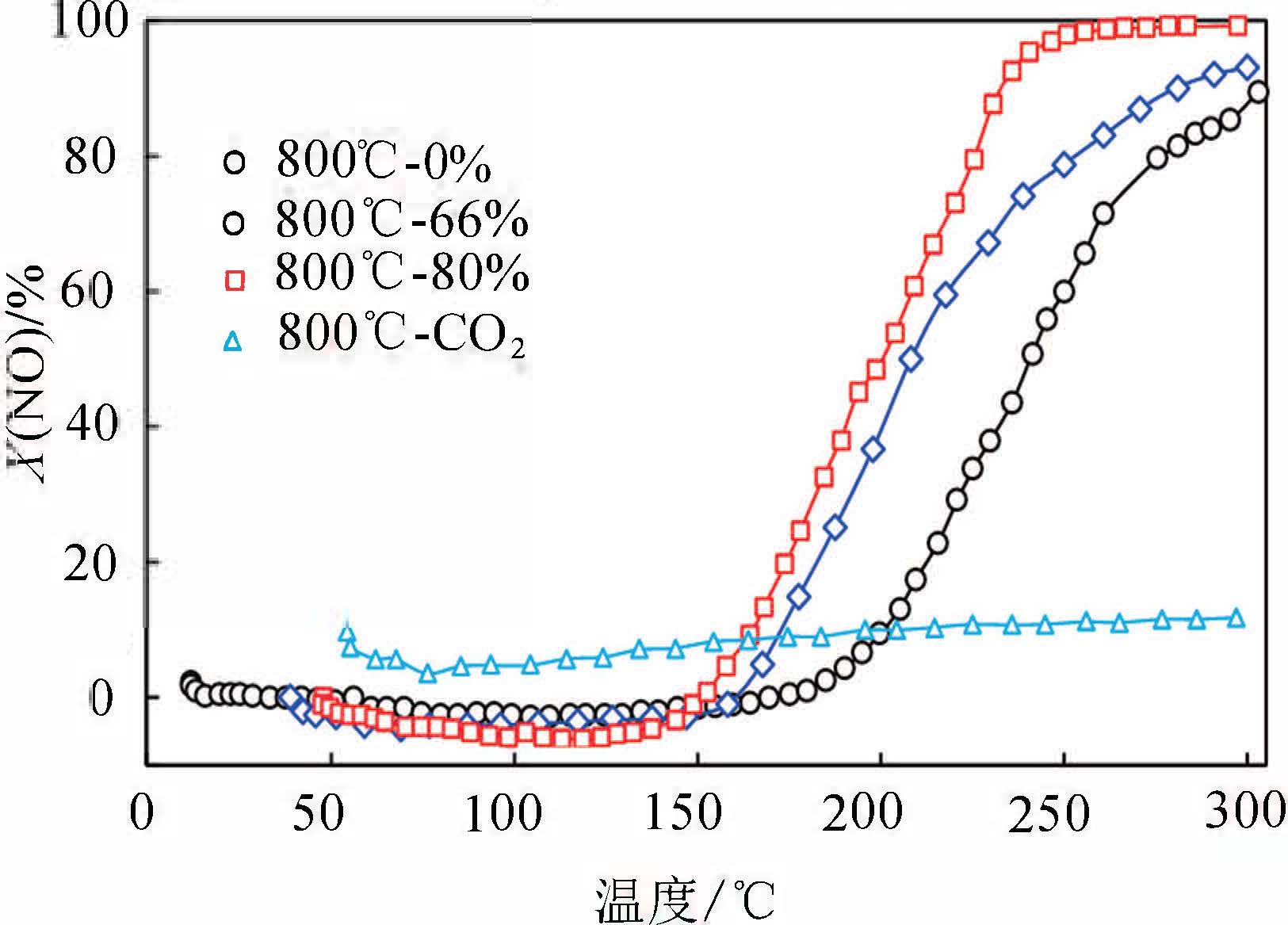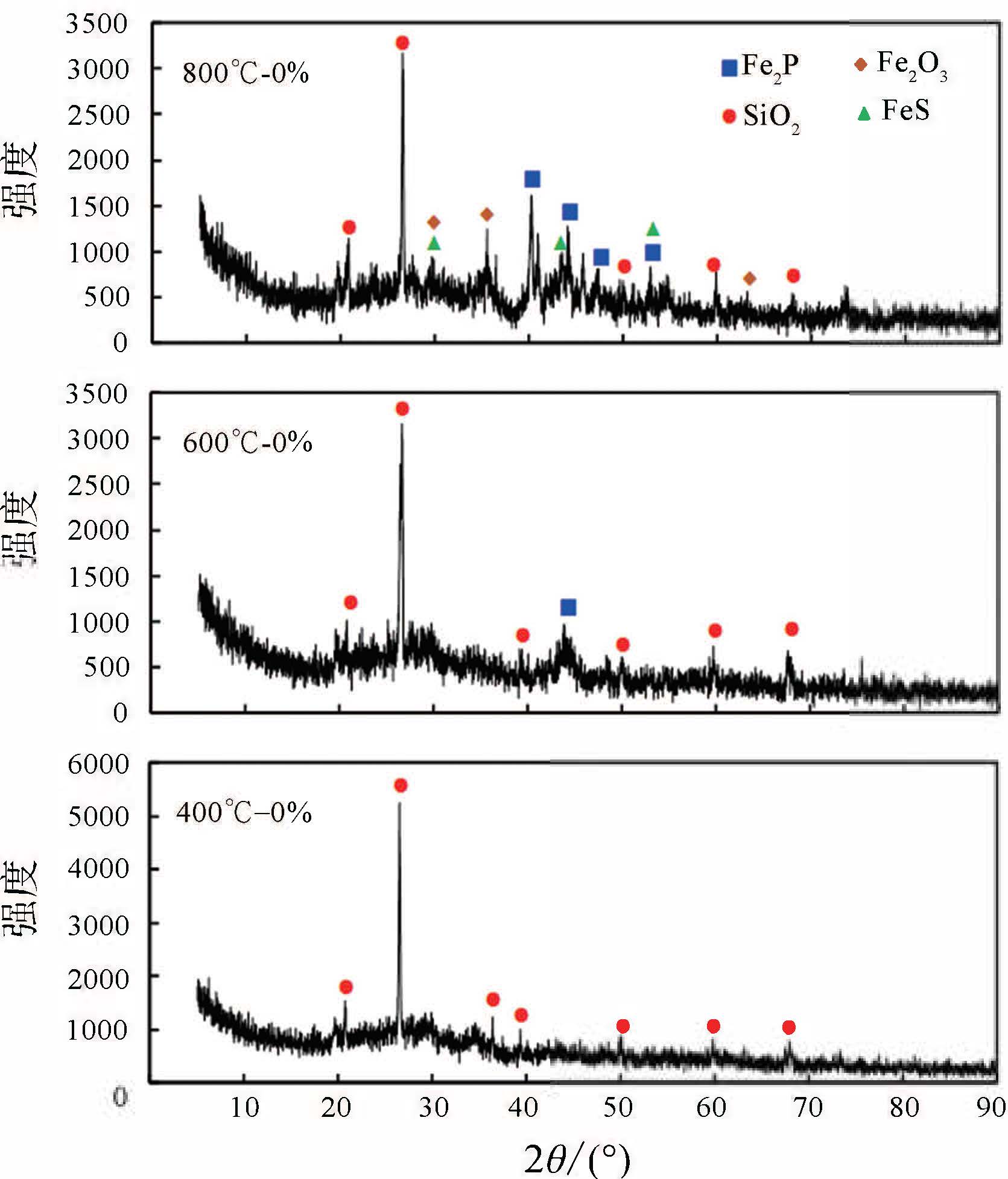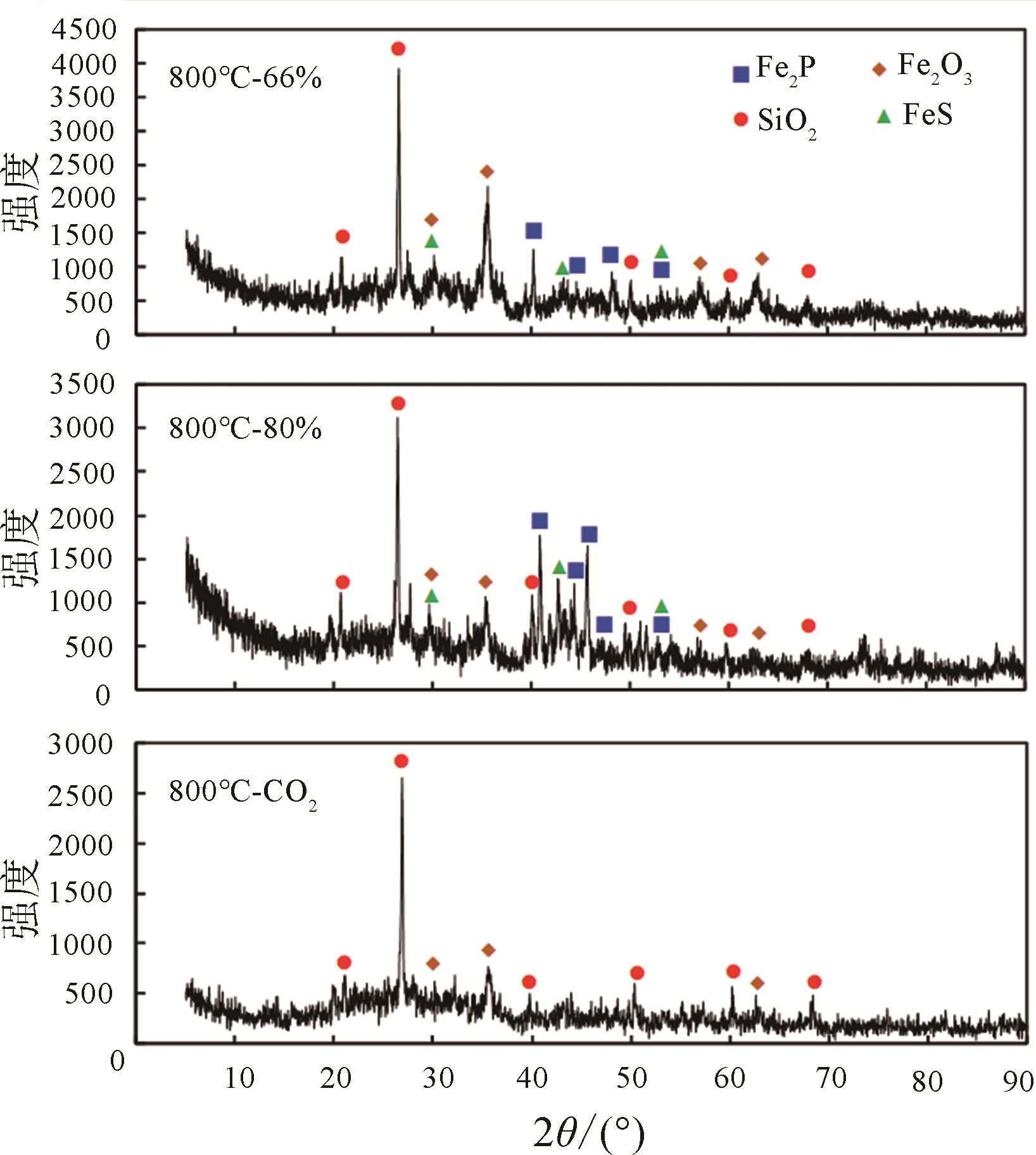Chemical Industry and Engineering Progress ›› 2020, Vol. 39 ›› Issue (S1): 263-269.DOI: 10.16085/j.issn.1000-6613.2019-1509
• Resources and environmental engineering • Previous Articles Next Articles
Low temperature reduction of NO over sludge char prepared under different pyrolysis conditions
Wenyi DENG( ), Cong TAO, Shijuan TIAN, Andong YIN, Yaxin SU
), Cong TAO, Shijuan TIAN, Andong YIN, Yaxin SU
- College of Environmental Science and Engineering, Donghua University, Shanghai 201620, China
-
Received:2019-09-23Online:2020-06-29Published:2020-05-20 -
Contact:Wenyi DENG
不同热解条件下制备的污泥炭低温还原NO
- 东华大学环境科学与工程学院,上海 201620
-
通讯作者:邓文义 -
作者简介:邓文义(1982—),男,博士,副教授,主要从事固体废弃物资源化利用研究。E-mail:dengwy@dhu.edu.cn 。 -
基金资助:上海自然科学基金(19ZR1400700);中央高校基本科研业务费专项(2232019D3-24)
CLC Number:
Cite this article
Wenyi DENG, Cong TAO, Shijuan TIAN, Andong YIN, Yaxin SU. Low temperature reduction of NO over sludge char prepared under different pyrolysis conditions[J]. Chemical Industry and Engineering Progress, 2020, 39(S1): 263-269.
邓文义, 陶聪, 田诗娟, 印安冬, 苏亚欣. 不同热解条件下制备的污泥炭低温还原NO[J]. 化工进展, 2020, 39(S1): 263-269.
share this article
Add to citation manager EndNote|Ris|BibTeX
URL: https://hgjz.cip.com.cn/EN/10.16085/j.issn.1000-6613.2019-1509
| 样品名称 | 灰分/% | 挥发分/% | 固定碳/% | 比表面积/m2·g-1 | 总孔容/m3·g-1 |
|---|---|---|---|---|---|
| 干污泥 | 30.6 | 58.5 | 10.9 | — | — |
| 400℃-0% | 64.1 | 24.1 | 11.8 | 12.3 | 0.032 |
| 600℃-0% | 67.3 | 20.7 | 12.0 | 22.5 | 0.051 |
| 800℃-0% | 82.8 | 6.0 | 11.2 | 40.6 | 0.088 |
| 800℃-66% | 84.2 | 6.6 | 9.2 | 93.1 | 0.141 |
| 800℃-80% | 83.4 | 7.7 | 8.9 | 102.4 | 0.125 |
| 800℃-CO2 | 92.8 | 3.3 | 3.9 | 173.5 | 0.189 |
| 样品名称 | 灰分/% | 挥发分/% | 固定碳/% | 比表面积/m2·g-1 | 总孔容/m3·g-1 |
|---|---|---|---|---|---|
| 干污泥 | 30.6 | 58.5 | 10.9 | — | — |
| 400℃-0% | 64.1 | 24.1 | 11.8 | 12.3 | 0.032 |
| 600℃-0% | 67.3 | 20.7 | 12.0 | 22.5 | 0.051 |
| 800℃-0% | 82.8 | 6.0 | 11.2 | 40.6 | 0.088 |
| 800℃-66% | 84.2 | 6.6 | 9.2 | 93.1 | 0.141 |
| 800℃-80% | 83.4 | 7.7 | 8.9 | 102.4 | 0.125 |
| 800℃-CO2 | 92.8 | 3.3 | 3.9 | 173.5 | 0.189 |
| 样品 | P | Fe | Mn | Ni | Cu | Zn | K | Na | Co | Mg |
|---|---|---|---|---|---|---|---|---|---|---|
| 800℃-0 | 14.0 | 41.1 | 0.4 | 0.2 | 1.4 | 0.2 | 5.3 | 2.6 | <0.1 | 6.3 |
| 样品 | P | Fe | Mn | Ni | Cu | Zn | K | Na | Co | Mg |
|---|---|---|---|---|---|---|---|---|---|---|
| 800℃-0 | 14.0 | 41.1 | 0.4 | 0.2 | 1.4 | 0.2 | 5.3 | 2.6 | <0.1 | 6.3 |
| 1 | 顾杨. 我国市政污泥干化焚烧技术应用[J]. 中国市政工程, 2016(3): 45-48. |
| GU Yang. Municipal sludge drying incineration technology & application in China[J]. China Municipal Engineering, 2016(3): 45-48. | |
| 2 | 郭明山, 金晶, 林郁郁, 等. 城市污泥慢速热解过程中氮的转化规律[J]. 化工进展, 2016, 35(1): 302-307. |
| GUO Mingshan, JIN Jing, LIN Yuyu, et al. Transformation mechanism of nitrogen of municipal sewage sludge in the slow pyrolysis process[J]. Chemical Industry and Engineering Progress, 2016, 35(1): 302-307. | |
| 3 | 金正宇, 张国臣, 王凯军. 热解技术资源化处理城市污泥的研究进展[J]. 化工进展, 2012, 31(1): 1-9. |
| JIN Zhengyu, ZHANG Guochen, WANG Kaijun. Research advance in resource recovery treatment of sewage sludge by pyrolysis[J]. Chemical Industry and Engineering Progress, 2012, 31(1): 1-9. | |
| 4 | SMITH K M, FOWLER G D, PULLKET S, et al. Sewage sludge-based adsorbents: a review of their production, properties and use in water treatment application[J]. Water Research, 2009, 43(10): 2569-2594. |
| 5 | CHA J S, CHOI J C, KO J H, et al. The low-temperature SCR of NO over rice straw and sewage sludge derived char[J]. Chemical Engineering Journal, 2010, 156(2): 321-327. |
| 6 | 任晓莉, 朱开金. 化学干法热解制备污泥吸附剂及其工艺优化[J]. 化工进展, 2013, 32(12): 2997-3031. |
| REN Xiaoli, ZHU Kaijin. Preparation of sludge-derived adsorbent by dry pyrolysis and its process optimization research[J]. Chemical Industry and Engineering Progress, 2013, 32(12): 2997-3031. | |
| 7 | GU L, ZHU N W, ZHOU P. Preparation of sludge derived magnetic porous carbon and their application in Fenton-like degradation of 1-diazo-2-naphthol-4-sulfonic acid[J]. Bioresource Technology, 2012, 118(4): 638-642. |
| 8 | 李奇隽, 汤常金, 张洪亮, 等. 碳材料用于低温选择性催化还原脱硝的研究进展[J]. 工业催化, 2017, 25(1): 1-8. |
| LI Qijuan, TANG Changjin, ZHANG Hongliang, et al. Research progress in carbon-based catalysts for NOx selective catalytic reduction at low temperature[J]. Industrial Catalysis, 2017, 25(1): 1-8. | |
| 9 | KONG Y, CHA C Y. Reduction of NOx adsorbed on char with microwave energy[J]. Carbon, 1996, 34(8): 1035-1040. |
| 10 | SHIRAHAMA N, MOON S H, CHOI K H, et al. Mechanistic study on adsorption and reduction of NO2 over activated carbon fibers[J]. Carbon, 2002, 40(14): 2605-2611. |
| 11 | XUE Y Y, LU G Z, GUO Y, et al. Effect of pretreatment method of activated carbon on the catalytic reduction of NO by carbon over CuO[J]. Applied Catalysis B: Environment, 2008, 79(3): 262-269. |
| 12 | WANG L Y, CHENG X X, WANG Z Q, et al. Investigation on Fe-Co binary metal oxides supported on activated semi-coke for NO reduction by CO[J]. Applied Catalysis B: Environment, 2017, 201: 636-651. |
| 13 | ILLÁ-GÓMEZ M J, RAYMUNDO-PIŇERO E, GARCÍA-GARCÍA A. Catalytic NOx reduction by carbon supporting metals[J]. Applied Catalysis B: Environment, 1999, 20(4): 267-275. |
| 14 | CHAI S L, ROBINSON J, MEI F C. A review on application of flocculants in wastewater treatment[J]. Process Safety and Environmental Protection, 2014, 92(6): 489-508. |
| 15 | BUSCH M, KOMPCH A, SULEIMAN S, et al. NOx conversion properties of a novel material: iron nanoparticles stabilized in carbon[J]. Applied Catalysis B: Environment, 2015, 166/167: 211-216. |
| 16 | LI X C, DONG Z, DOU J X, et al. Catalytic reduction of NO using iron oxide impregnated biomass and lignite char for flue gas treatment[J]. Fuel Processing Technology, 2016, 148: 91-98. |
| 17 | XIAO J B, XU Q X, XU Q, et al. Direct promotion effect of Fe on NO reduction by activated carbon loaded with Fe species[J]. The Journal of Chemical Thermodynamics, 2016, 95: 216-230. |
| 18 | JO Y B, CHA J S, KO J H, et al. NH3 selective catalytic reduction (SCR) of nitrogen oxides (NOx) over activated sewage sludge char[J]. Korean Journal of Chemical Engineering, 2011, 28(1): 106-113. |
| 19 | CHEN H, CHEN D Z, HONG L. Influences of activation agent impregnated sewage sludge pyrolysis on emission characteristics of volatile combustion and de-NOx performance of activated char[J]. Applied Energy, 2015, 156: 767-775. |
| 20 | 彭亮, 李彩亭, 李彩霞, 等. 以污泥为载体的金属氧化物脱硝催化剂的研究[J]. 环境工程学报, 2008, 2(4): 522-526. |
| PENG Liang, LI Caiting, LI Caixia, et al. Preparation of catalyst for denitrification using raw sludge and metal oxide[J]. Chinese Journal of Environmental Engineering, 2008, 2(4): 522-526. | |
| 21 | DENG W Y, YIN A D, MA J C, et al. Investigation of NO conversion by different types of sewage sludge chars under low temperature[J]. Journal of Environmental Management, 2018, 209: 236-244. |
| 22 | 印安冬, 邓文义, 马璟宸, 等. 污泥热解炭脱除NO特性[J]. 化工学报, 2018, 69(6): 2655-2663. |
| YIN Andong, DENG Wenyi, MA Jingchen, et al. Properties on NO removal over pyrolyzed sludge carbon[J]. CIESC Journal, 2018, 69(6): 2655-2663. | |
| 23 | 煤的工业分析方法: GB/T 212—2008 [S]. 2008.Proximate analysis of coal: GB/T 212—2008 [S]. 2008. |
| 24 | 解立平, 林伟刚, 杨学民. 城市固体有机废弃物制备中孔活性炭[J]. 过程工程学报, 2002, 2(5): 465-469. |
| XIE Liping, LIN Weigang, YANG Xuemin. Preparation of mesopore activated carbon from municipal solid organic wastes[J]. The Chinese Journal of Process Engineering, 2002, 2(5): 465-469. | |
| 25 | RAMBABU N, AZARGOHAR R, DALAI A K, et al. Evaluation and comparison of enrichment efficiency of physical/chemical activations and functionalized activated carbons derived from fluid petroleum coke for environmental applications[J]. Fuel Processing Technology, 2013, 106: 501-510. |
| 26 | 胡艳军, 郑小艳, 严密, 等. 湿污泥热解残渣微观孔隙结构及吸附性能[J]. 燃烧科学与技术, 2016, 22(2): 121-125. |
| HU Yanjun, ZHENG Xiaoyan, YAN Mi, et al. Microscopic pore structure and adsorption properties of resulting residue derived from wet sewage sludge pyrolysis[J]. Journal of Combustion Science and Technology, 2016, 22(2): 121-125. | |
| 27 | VARGAS J E, GUTIERREZ L G, MORENO-PIRAJÁN J C. Preparation of activated carbons from seeds of Mucuna mutisiana by physical activation with steam[J]. Journal of Analytical and Applied Pyrolysis, 2010, 89(2): 307-312. |
| 28 | CHEN Y, ZHANG Z T, LIU L L, et al. In situ DRIFTS studies on MnOx nanowires supported by activated semi-coke for low temperature selective catalytic reduction of NOx with NH3[J]. Applied Surface Science, 2016, 366: 139-147. |
| 29 | SEREDYCH M, BANDOSZ T J. Sewage sludge as a single precursor for development of composite adsorbents/catalysts[J]. Chemical Engineering Journal, 2007, 128(1): 59-67. |
| 30 | ZHOU H, SU Y, LIAO W, et, al. Preparation, characterization, and properties of monolithic Fe/Al2O3/cordierite catalysts for NO reduction with C2H6[J]. Applied Catalysis A: General, 2015, 505: 402-409. |
| 31 | FAN H, HE K, WANG J. Study of sewage sludge pyrolysis liquids using comprehensive two-dimensional gas chromatography/time-of-flight mass spectrometry[J]. Fuel, 2016, 185: 281-288. |
| 32 | FELS L E, ZAMAMA M, ASLI A E, et al. Assessment of biotransformation of organic matter during co-composting of sewage sludge-lignocelullosic waste by chemical FTIR analyses, and phytotoxicity tests[J]. International Biodeterioration & Biodegradation, 2014, 87: 128-137. |
| 33 | BEKIARIS G, PELTRE C, JENSEN L S, et al. Using FTIR-photoacoustic spectroscopy for phosphorus speciation analysis of biochars[J]. Spectrochimica Acta A: Molecular and Biomolecular Spectroscopy, 2016, 168: 29-36. |
| 34 | SONG X D, XUE X Y, CHEN D Z, et al. Application of biochar from sewage sludge to plant cultivation: influence of pyrolysis temperature and biochar-to-soil ratio on yield and heavy metal accumulation[J]. Chemosphere, 2014, 109: 213-220. |
| 35 | LIU J, LI G Q, CHEN L, et al. Effects of atmospheric gas on pyrolysis characteristics of briquetted lignite and surface properties of semi-char[J]. Fuel Processing Technology, 2016, 151: 40-49. |
| 36 | LU H, ZHANG W, WANG S, et al. Characterization of sewage sludge-derived biochars from different feedstocks and pyrolysis temperatures[J]. Journal of Analytical and Applied Pyrolysis, 2013, 102: 137-143. |
| 37 | WANG L, ZHAO J H, BAI S L, et al. Significant catalytic effects induced by the electronic interactions between carboxyl and hydroxyl group modified carbon nanotube supports and vanadium species for NO reduction with NH3 at low temperature[J]. Chemical Engineering Journal, 2014, 254: 399-409. |
| 38 | TSENG H, TU Y T, LAI Y C, et al. Reduction of NO with NH3 over carbon catalysts: the effects of treating carbon with H2SO4 and HNO3[J]. Carbon, 2001, 39(4): 575-580. |
| [1] | SHI Yongxing, LIN Gang, SUN Xiaohang, JIANG Weigeng, QIAO Dawei, YAN Binhang. Research progress on active sites in Cu-based catalysts for CO2 hydrogenation to methanol [J]. Chemical Industry and Engineering Progress, 2023, 42(S1): 287-298. |
| [2] | HUI Bo, HOU Hongyi, ZHANG Tao, CHE Shengwen. Drying characteristics of cylindrical annular pulsating heat pipe [J]. Chemical Industry and Engineering Progress, 2023, 42(S1): 33-40. |
| [3] | DAI Huantao, CAO Lingyu, YOU Xinxiu, XU Haoliang, WANG Tao, XIANG Wei, ZHANG Xueyang. Adsorption properties of CO2 on pomelo peel biochar impregnated by lignin [J]. Chemical Industry and Engineering Progress, 2023, 42(S1): 356-363. |
| [4] | LIU Xuanlin, WANG Yikai, DAI Suzhou, YIN Yonggao. Analysis and optimization of decomposition reactor based on ammonium carbamate in heat pump [J]. Chemical Industry and Engineering Progress, 2023, 42(9): 4522-4530. |
| [5] | LI Dongze, ZHANG Xiang, TIAN Jian, HU Pan, YAO Jie, ZHU Lin, BU Changsheng, WANG Xinye. Research progress of NO x reduction by carbonaceous substances for denitration in cement kiln [J]. Chemical Industry and Engineering Progress, 2023, 42(9): 4882-4893. |
| [6] | ZHU Chuanqiang, RU Jinbo, SUN Tingting, XIE Xingwang, LI Changming, GAO Shiqiu. Characteristics of selective non-catalytic reduction of NO x with solid polymer denitration agent [J]. Chemical Industry and Engineering Progress, 2023, 42(9): 4939-4946. |
| [7] | LI Zhiyuan, HUANG Yaji, ZHAO Jiaqi, YU Mengzhu, ZHU Zhicheng, CHENG Haoqiang, SHI Hao, WANG Sheng. Characterization of heavy metals during co-pyrolysis of sludge with PVC [J]. Chemical Industry and Engineering Progress, 2023, 42(9): 4947-4956. |
| [8] | BAI Zhihua, ZHANG Jun. Oxidative removal of NO in DTPMPA/Fenton system [J]. Chemical Industry and Engineering Progress, 2023, 42(9): 4967-4973. |
| [9] | WANG Haoran, YIN Quanyu, FANG Ming, HOU Jianlin, LI Jun, HE Bin, ZHANG Mingyue. Optimization of near critical-water treatment process of tobacco stems [J]. Chemical Industry and Engineering Progress, 2023, 42(9): 5019-5027. |
| [10] | JIANG Jing, CHEN Xiaoyu, ZHANG Ruiyan, SHENG Guangyao. Research progress of manganese-loaded biochar preparation and its application in environmental remediation [J]. Chemical Industry and Engineering Progress, 2023, 42(8): 4385-4397. |
| [11] | ZHENG Mengqi, WANG Chengye, WANG Yan, WANG Wei, YUAN Shoujun, HU Zhenhu, HE Chunhua, WANG Jie, MEI Hong. Application and prospect of algal-bacterial symbiosis technology in zero liquid discharge of industrial wastewater [J]. Chemical Industry and Engineering Progress, 2023, 42(8): 4424-4431. |
| [12] | LI Haidong, YANG Yuankun, GUO Shushu, WANG Benjin, YUE Tingting, FU Kaibin, WANG Zhe, HE Shouqin, YAO Jun, CHEN Shu. Effect of carbonization and calcination temperature on As(Ⅲ) removal performance of plant-based Fe-C microelectrolytic materials [J]. Chemical Industry and Engineering Progress, 2023, 42(7): 3652-3663. |
| [13] | LI Yanling, ZHUO Zhen, CHI Liang, CHEN Xi, SUN Tanglei, LIU Peng, LEI Tingzhou. Research progress on preparation and application of nitrogen-doped biochar [J]. Chemical Industry and Engineering Progress, 2023, 42(7): 3720-3735. |
| [14] | YAO Liming, WANG Yazhuo, FAN Honggang, GU Qing, YUAN Haoran, CHEN Yong. Treatment status of kitchen waste and its research progress of pyrolysis technology [J]. Chemical Industry and Engineering Progress, 2023, 42(7): 3791-3801. |
| [15] | LU Shaojie, LIU Jia, JI Qianzhu, LI Ping, HAN Yueyang, TAO Min, LIANG Wenjun. Preparation of diatomaceous earth-based composite filler and its xylene removal performance by a biotrickling filter [J]. Chemical Industry and Engineering Progress, 2023, 42(7): 3884-3892. |
| Viewed | ||||||
|
Full text |
|
|||||
|
Abstract |
|
|||||





